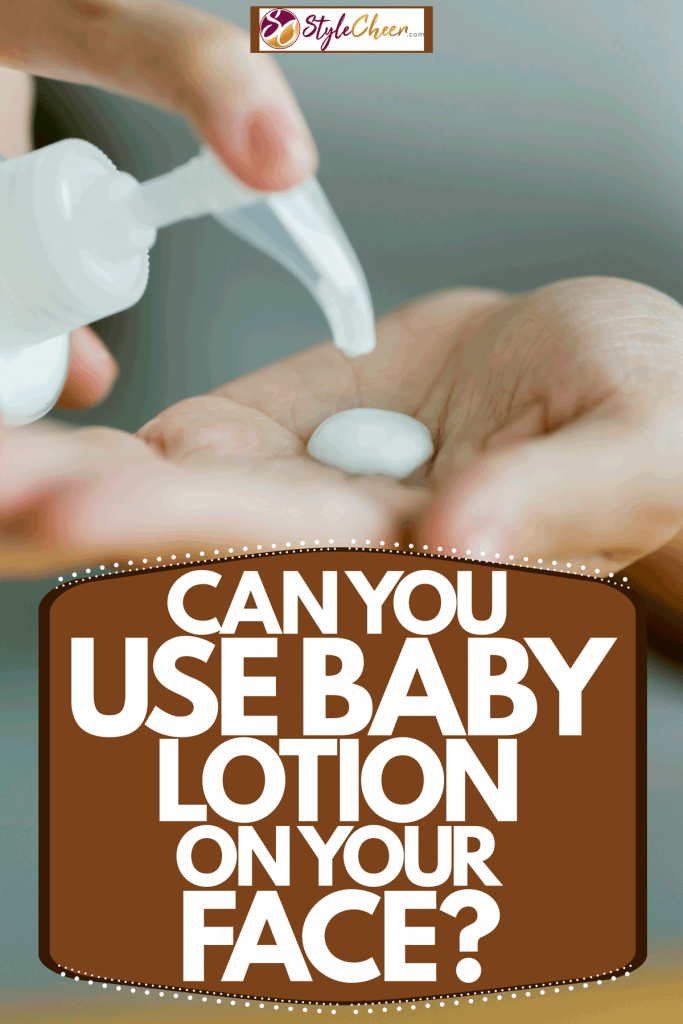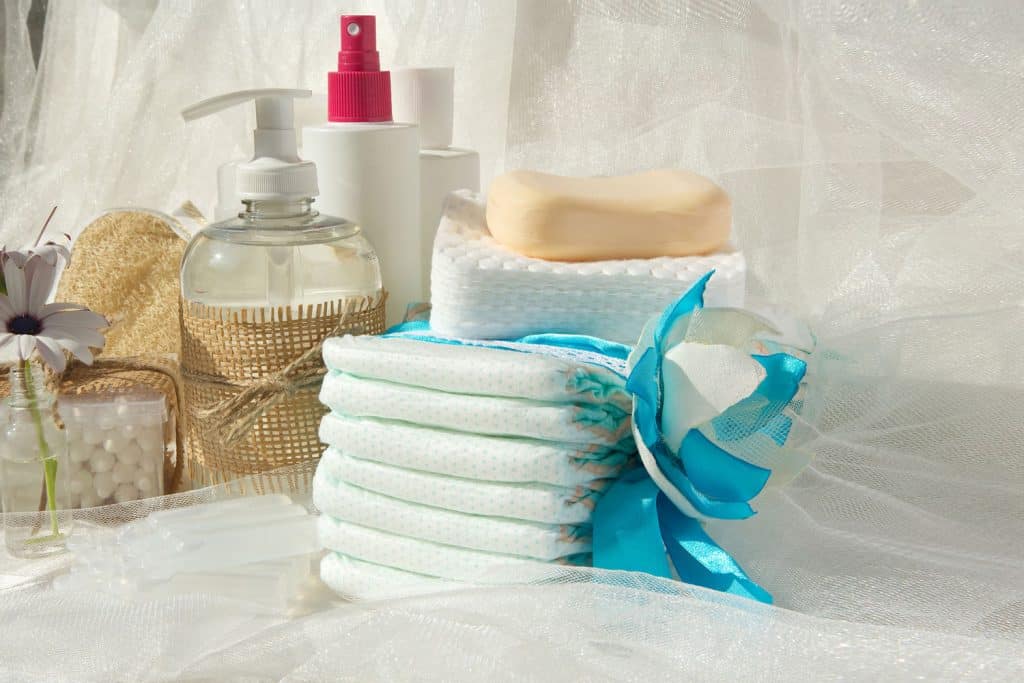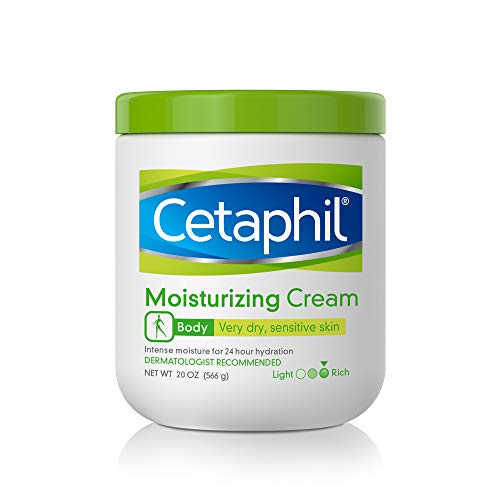You may look at a bottle of baby lotion and see the words sensitive and moisturizing and think to yourself, “those are the qualities I look for in a moisturizer.” Baby lotion fits the bill of a facial moisturizer, but should you use it on your face? We have done extensive research, and here is all you need to know about your face and baby lotion.
While baby lotion is indeed both moisturizing and gentle, it is not the best moisturizer to use for your face. It can be used in a pinch if you must, but it should not be used daily. The reason why all comes down to a little thing called a comedogenic rating (we will learn more about this later on). Essentially, the baby lotion is made with newborn skin in mind and not an adult’s face. Using it daily could result in acne.
It may sound confusing that something is sensitive enough for a newborn but not for an adult — but if you keep reading, it will all be explained. We are going to go over why baby lotion could be bad for your face, what you should use instead, and more.

This article may include affiliate links and elements that were carefully created by our team using advanced ai to help you envision the best style advice.
Can You Use Baby Lotion As a Face Moisturizer?
Baby lotion is marketed to be one of the most sensitive and moisturizing lotions on earth. So it’s easy to see why anyone would reach for a bottle of the pink stuff to moisturize their face before bed.
However, ingredients are lurking in that lotion that can mean bad news for your face. Newborns’ skin is very fragile and cannot retain moisture as well as adult skin can. That is why baby lotion is packed with alcohols and oils that help seal in all the moisture possible.
The downside of using it as a face lotion is that some ingredients are not very pore-friendly to create that protective barrier for newborn skin.
Does baby lotion clog pores on your face?

The simple answer to this is, yes it can. This is where the comedogenic rating comes in. A comedogenic rating is a 0 to 5 scale that determines the likelihood of a substance clogging your pores and causing acne. Baby lotion is an acceptable facial moisturizer apart from its coconut oil. Coconut oil has a comedogenic rating of 4, which is likely to clog most people’s pores.
It may be hard to wrap your head around what products could or could not clog your pores, so we are going to walk through the scale together to find things we should look for and avoid in daily moisturizers.
Non-comedogenic
First, there are the non-comedogenic substances rated 0 to 2, which will be the best for your skin. A few oils in this range include argan oil rated 0, castor oil rated 1, and almond oil rated 2. Thinner, lighter oils are going to be easily absorbed into the skin and, therefore, will be less likely to clog pores and cause acne.
Click here to see Neutrogena non-comedogenic moisturizer at Amazon.
Comedogenic
On the other side of the spectrum, we have the comedogenic substances rated 3 to 5. A few moisturizers in this category include avocado oil rated 3, cocoa butter rated 4, and wheat germ oil rated 5. As the oils get heavier and thicker, the likelihood of it clogging pores goes up.
Even though these oils can clog your pores, they still have a place in the skincare world. Anything on the higher end of the comedogenic scale is good for general body use or on dry skin patches such as knees or elbows. They can also be used for dry spot treatments on the face as well; it’s just not recommended for use on the entire face.
Should you use cream or lotion on your face?
A major thing to remember is that everyone’s skin is different and requires different treatment. A general rule of thumb is to use facial lotions if you have oily to slightly dry skin and creams if you have dry to very dry skin. It is also a good idea to change moisturizers to fit the seasons: lighter lotions or serums when it is warm and heavier creams for colder times of the year.
Click here to see Cetaphil moisturizing cream at Amazon.
Is it bad to use lotion on your face every day?
No, it is not bad to use lotion on your face every day. However, that only stands true if you are using the correct amount of lotion and it is non-comedogenic, rated at level 2 and under.
On average, you should use a nickel-sized amount of lotion on your face. Any more than that, and you run the risk of suffocating your skin. Remember when applying moisturizer that we want to seal in moisture with that protective layer while still letting our skin breathe through the product. If you are going to use a daily moisturizing lotion on your face, it is also important to consider the SPF.
Is SPF important in skincare?
SPF is something that is often overlooked when it comes to finding the right moisturizer. According to the American Academy of Dermatology Association, you should wear SPF every day if you will be outside, “The sun emits harmful UV rays year-round. Even on cloudy days, up to 80% of the sun’s harmful UV rays can penetrate your skin.” The AADA suggests an SPF of at least 30, as that blocks 97% of the sun’s UVB rays.
To protect the sensitive skin on your face, go for face lotions that have SPF or even makeup products that have some level of UV protection.
Click here to see CeraVe moisturizing lotion with SPF 30 at Amazon.
What to consider when looking for a face moisturizer
That was a lot of skincare information, so here is a concise breakdown of what you should be considering when finding your next lotion.
- Is it meant for your face? Anything not marketed for facial use will most likely have pore-clogging ingredients.
- Your skin type: For oily, combination, normal, dry, and very dry skin types use lotions, including on oily to normal skin. Use creams for dry to severely dry skin types.
- Check the ingredients and the comedogenic ratings of oils used in the product to determine if it would be good for your skin.
- No matter the weather, be sure to include some form of SPF in your facial skincare routine, SPF 30 at the least.
Final Thoughts
Skin is the biggest organ we have, and moisturizing is essential to keeping that organ happy and healthy. Although the skin on our arms and legs can withstand some harsher products and ingredients, not all areas of our skin have the same level of sensitivity. Some of our most sensitive skin is located on our face so it’s important to remain vigilant when choosing the products we use.
For more great tips on your skincare routine, check out our related articles:




![Scientist holding Cyanoacrylate glue, Is There An Eyelash Glue Without Cyanoacrylate? [A Guide to Finding Safe Alternatives] - 1600x900](https://stylecheer.com/wp-content/uploads/2023/09/shutterstock_2238414685-300x169.jpg)
![Applying lash glue onto fake eyelashes, Why Is My Lash Glue Not Sticking? [Common Reasons and Solutions] - 1600x900](https://stylecheer.com/wp-content/uploads/2023/09/shutterstock_1059533828-300x169.jpg)
![Pouring black lash glue onto a small mat, What Glue Do Lash Techs Use? [A Guide to Lash Extension Adhesives] - 1600x900](https://stylecheer.com/wp-content/uploads/2023/09/shutterstock_1541038103-300x169.jpg)